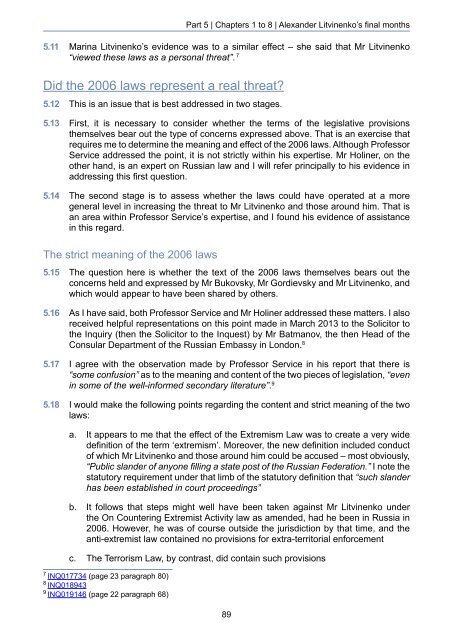The Litvinenko Inquiry
JIEp7Zyr
JIEp7Zyr
Create successful ePaper yourself
Turn your PDF publications into a flip-book with our unique Google optimized e-Paper software.
Part 5 | Chapters 1 to 8 | Alexander <strong>Litvinenko</strong>’s final months<br />
5.11 Marina <strong>Litvinenko</strong>’s evidence was to a similar effect – she said that Mr <strong>Litvinenko</strong><br />
“viewed these laws as a personal threat”. 7<br />
Did the 2006 laws represent a real threat?<br />
5.12 This is an issue that is best addressed in two stages.<br />
5.13 First, it is necessary to consider whether the terms of the legislative provisions<br />
themselves bear out the type of concerns expressed above. That is an exercise that<br />
requires me to determine the meaning and effect of the 2006 laws. Although Professor<br />
Service addressed the point, it is not strictly within his expertise. Mr Holiner, on the<br />
other hand, is an expert on Russian law and I will refer principally to his evidence in<br />
addressing this first question.<br />
5.14 <strong>The</strong> second stage is to assess whether the laws could have operated at a more<br />
general level in increasing the threat to Mr <strong>Litvinenko</strong> and those around him. That is<br />
an area within Professor Service’s expertise, and I found his evidence of assistance<br />
in this regard.<br />
<strong>The</strong> strict meaning of the 2006 laws<br />
5.15 <strong>The</strong> question here is whether the text of the 2006 laws themselves bears out the<br />
concerns held and expressed by Mr Bukovsky, Mr Gordievsky and Mr <strong>Litvinenko</strong>, and<br />
which would appear to have been shared by others.<br />
5.16 As I have said, both Professor Service and Mr Holiner addressed these matters. I also<br />
received helpful representations on this point made in March 2013 to the Solicitor to<br />
the <strong>Inquiry</strong> (then the Solicitor to the Inquest) by Mr Batmanov, the then Head of the<br />
Consular Department of the Russian Embassy in London. 8<br />
5.17 I agree with the observation made by Professor Service in his report that there is<br />
“some confusion” as to the meaning and content of the two pieces of legislation, “even<br />
in some of the well-informed secondary literature”. 9<br />
5.18 I would make the following points regarding the content and strict meaning of the two<br />
laws:<br />
a. It appears to me that the effect of the Extremism Law was to create a very wide<br />
definition of the term ‘extremism’. Moreover, the new definition included conduct<br />
of which Mr <strong>Litvinenko</strong> and those around him could be accused – most obviously,<br />
“Public slander of anyone filling a state post of the Russian Federation.” I note the<br />
statutory requirement under that limb of the statutory definition that “such slander<br />
has been established in court proceedings”<br />
b. It follows that steps might well have been taken against Mr <strong>Litvinenko</strong> under<br />
the On Countering Extremist Activity law as amended, had he been in Russia in<br />
2006. However, he was of course outside the jurisdiction by that time, and the<br />
anti-extremist law contained no provisions for extra-territorial enforcement<br />
c. <strong>The</strong> Terrorism Law, by contrast, did contain such provisions<br />
7<br />
INQ017734 (page 23 paragraph 80)<br />
8<br />
INQ018943<br />
9<br />
INQ019146 (page 22 paragraph 68)<br />
89


